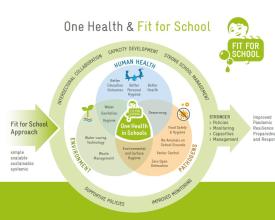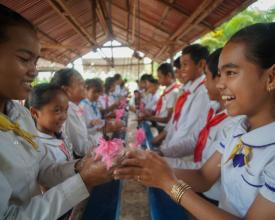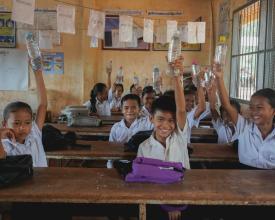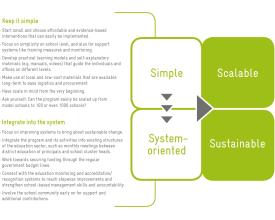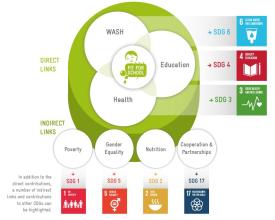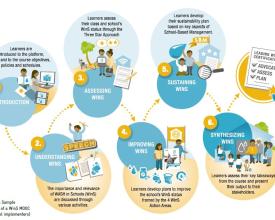
WASH in Schools brings One Health to Life - GIZ's Fit for School Approach
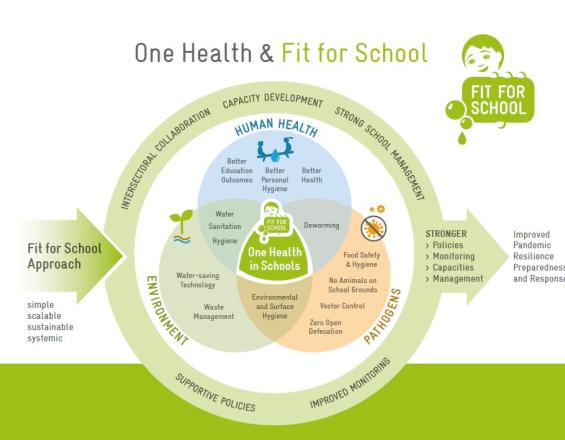
The GIZ regional Fit for School programme promotes and supports tangible actions in schools that are contributing to the practical implementation of the One Health concept. WASH in Schools (WinS) and improved hygiene are the strong uniting elements:
Human Health
- Improving health and personal hygiene Improved health through evidence based interventions (e.g. handwashing, deworming, toothbrushing, cleaning)
Environment
- Improved school environment (access to WASH)
- Water-saving handwashing technologies
- Waste management
Pathogens
- Bi-annual school-based deworming according to national guidelines Improved food hygiene, where applicable
- Elimination of pathogens from the school yard
- Keeping animals out from the school premises
- Zero open defecation
These actions, facilitated by measures that enable their implementation and management, not only directly benefit school environments, but also provide practical models and knowledge for better resilience, preparedness and response of schools to the current and future pandemics.
Context
Challenges addressed
The COVID-19 pandemic has shone a spotlight on the still sizable gaps in access to safe drinking water, functional toilets, and handwashing facilities at schools around the world. According to the WHO/UNICEF Joint Monitoring Programme (JMP) on Water Supply, Sanitation and Hygiene, 287 million children attend schools which use water from an unimproved source, such as an unprotected well or river, or have no water source at all. A further 367 million go to schools which have no sanitation facilities or only unimproved sanitation facilities, and 462 million visit schools with no handwashing facilities at all.
Diseases related to lack of hygiene, such as diarrhea, intestinal worms, and other infectious diseases, are still among the leading causes of illness and death among children in many countries.
Location
Process
Summary of the process
Schools are also places where the three different domains of One Health naturally intersect and can be implemented in tangible ways. The school’s environment itself influences child health and well-being, contact with and spread of pathogens and other health risks.
The Covid-19 pandemic has again highlighted this central role of schools. The transmission mode of Covid-19 requires schools to step-up their efforts for Water, Sanitation and Hygiene (WASH) – particularly water and facilities for handwashing, as well as increased surface hygiene throughout the school facilities. On the other hand, the school as an institution provides a setting for implementing and managing practical One Health measures within its scope of action.
Fit for School strengthens the education sector and intersectoral collaboration by working along the four key principles of simplicity, scalability, sustainability and systemic thinking - enables governments and line ministries to:
- Work together effectively across different sectors.
- Develop a comprehensive supportive policy framework for WinS.
- Develop WinS monitoring and recognition systems that trigger action.
- Build capacity for practical implementation and better management at all levels, including the school level.
Building Blocks
Intersectoral Collaboration
Alignment of relevant sectors (health & WASH) under the leadership of the education sector.
Enabling factors
The program works on strengthening intersectoral working groups, setting clear roles and coordination mechanisms at all levels, integration of public health topics in education sector policies and structures, and provides platforms for international learning exchange.
Lesson learned
- A school health or WASH in schools policy serves as a solid basis for clarifying roles with other sectors and to coordinate collaboration.
- A policy framework supports alignment and harmonization of development partner support.
- Regular exchange and joint decision-making through e.g. a technical working group facilitates moving the topic foward and keeping all relevant actors involved.
Supportive Policies
Supportive policy and frameworks guide implementation.
Enabling factors
The programme works closely with the Ministries of Education in the development of national WASH in Schools policies and their implementation guidelines.
Lesson learned
- Supporting WASH in Schools (WinS) and school health policy development facilitates anchoring and focusing implementation processes and key interventions
- Supporting the development of implementation guidelines allows for practical application of policies
- Developing and locally contextualizing the WinS Three Star Approach (UNICEF/GIZ 2013) – an integrated monitoring and recognition system, that encourages stepwise improvements - proved invaluable to illustrate for countries in the region, how they could advance WinS with existing resources and structures
Resources
Capacity Development
Large-scale capacity development embedded in the education system.
Enabling factors
WinS Massive Open Online Courses are conducted to build management and leadership capacities of staff at the school and division levels. Between 2019 and 2021 a number of 22,500 educators have enrolled in the course.
Knowledge products such as manuals and videos are produced to provide practical implementation guidelines.
Seven International Learning Exchanges serve as capacity building through exchange of ideas and best practices to trigger action and improve implementation.
Lesson learned
- Training roll-out should consider long-term feasibility: by utilizing existing Ministry meeting structures (e.g. the district education advisor´s regular technical meetings with school principals) can keep costs at a minimum and help to focus the content into digestible chunks
- When designing larger scale capacity measures, such as online courses for education sector personnel, best utilize existing Ministry platforms for training delivery and seek accreditation for the course as part of the development process to create in-system incentives for personnel to complete the course
Monitoring System
What gets measured, gets done. WinS monitoring and recognition systems strengthen large-scale WinS implementation.
Enabling factors
The program supports the national integration of SDG indicators related to school health and WASH in Schools, as well as implementation of the WinS Three Star Approach – an integrated monitoring and recognition system that guides and encourages stepwise improvements and enables more specific WinS programme management. The programme further supports visualization of data using a WinS dashboard, regular reports and feedback mechanisms to schools.
Lesson learned
- WinS/Three Star monitoring and recognition system (Philippines, Lao PDR, Cambodia, Indonesia) has helped to move WinS improvments forward, but is a process that takes time and needs to involve the Ministry in the driver´s seat and partners willing to align and support
- Data visualization via WinS dashboards can be a powerful tool to create transparency and allow schools, districts and provinces to develop a sense of where they stand relative to others - which in turn might motivate further improvements
- The WinS/Three Star monitoring system in Cambodia and the availability of national data proved crucial to plan for COVID-19 response measures and support and illustrated the practical application of monitoring data for various ministries involved
- Monitoring and self assessment serve as a strong capacity development measure - through careful design schools can be guided on what to prioritze and how to progress through improvements over time
School Based Management Solutions
Practical implementation guidelines strengthen school based management.
Enabling factors
Integration of measures in school routines and improvement of planning, promoting community involvement and participation. School-level monitoring and budgeting are supported by the program through practical implementation guidelines to strengthen school-based management.
Lesson learned
- Integration of measures in school improvement planning is a straighforward way to ensure time and resource allocation for activities and improvements. For that, it is necessary that school management considers school health and WinS as part of their core tasks
- Community involvement and participation are the most powerful tool to achieve improvements despite limited government budgets for infrastructure and materials. District level officials can play an important facilitating role in that process
- School level monitoring and budgeting need to be based on understanding the benchmarks that need to be achieved, the current status, and take into account available resources from Ministry side and community support
Impacts
Human Health
Proven health and hygiene improvements among children in schools participating in the Fit for School Programme:
- Daily toothbrushing practices led to 17 to 37% less tooth decay among students in implementing schools
- Programme strengthened the implementation of existing national deworming programmes
- Interventions showed positive health effects in terms of weight increase
- Better access to WASH facilities, and improved practice of handwashing with soap
Environment
WinS leads to healthier learning environments. WASH related environmental aspects are addressed in schools:
- WASHALOT 3.0, a lowcost group handwashing station with minimal water use developed
- Waste management as part of WinS policies (e.g. Philippines, Indonesia)
Pathogens
Improved personal hygiene and safer learning environments lead to reduced pathogen exposure:
- Regular handwashing leads to interruption of fecal-oral disease transmission
- Collaboration with World Food Programme to improve food hygiene in Lao PDR
- Improved sanitation and less open defecation
- Implementation of regular school-based deworming
- Vector-Control (e.g. elimination of mosquito breeding places on school grounds)
- No animals on school grounds
Beneficiaries
Schools are important community places where children spend a great part of their day. They are an ideal setting for providing a healthy and safe environment to benefit health and education. They also set examples for parents and the community at large.
Sustainable Development Goals
Story
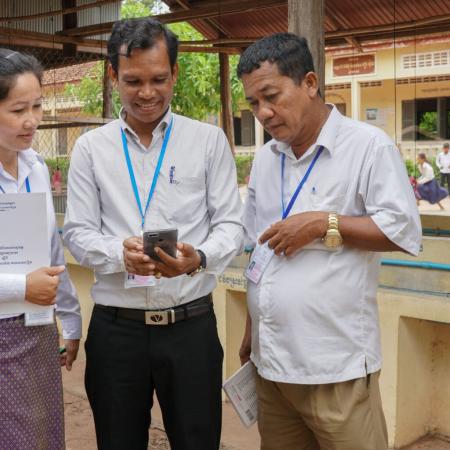
‘What gets monitored gets done’
Since the adoption of the Sustainable Development Goals (SDGs) – particularly SDG6 (clean water and sanitation), but also SDG 3 (good health and well-being), SDG4 (quality education), and SDG5 (gender equality) – the attention being paid to WASH in schools has risen markedly.
At the global level the JMP leads efforts to monitor progress towards SDG targets, using a ‘service ladder’ approach to classify schools according to the level of WASH services they provide (advanced, limited, basic or no service). National governments report annually against these targets, setting their own national WASH standards for schools and monitoring progress towards them.
‘Monitoring and evaluation systems drive action,’ explains Bella Monse, senior advisor with the Regional Fit for School Program, which is implemented by the Deutsche Gesellschaft für Internationale Zusammenarbeit (GIZ) in partnership with the South-East Asian Ministers of Education Organization (SEAMEO) on behalf of BMZ. ‘It’s often said that “what gets monitored gets done,”’ she continues. ‘Our experience has shown this to be true.’
The Regional Fit for School Program works closely with ministries of education in Cambodia, Indonesia, Laos and the Philippines to implement and monitor strategies designed to incentivise sustainable improvements in water, sanitation and hygiene in schools. The Three Star Approach is one such strategy. Developed in 2013 as a joint effort between UNICEF and GIZ, and first introduced in the Philippines through the Department of Education, the Three Star Approach is a national benchmarking system which helps schools to bridge the gap between currently existing WASH services and national standards based on SDG-linked global targets.


